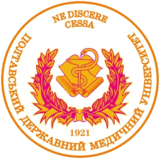Будь ласка, використовуйте цей ідентифікатор, щоб цитувати або посилатися на цей матеріал:
http://repository.pdmu.edu.ua/handle/123456789/19253Повний запис метаданих
| Поле DC | Значення | Мова |
|---|---|---|
| dc.contributor.author | Toronchenko, Olha M. | - |
| dc.contributor.author | Bredun, Viktor I. | - |
| dc.contributor.author | Smoliar, Natalia O. | - |
| dc.contributor.author | Торонченко, Ольга Миколаївна | - |
| dc.date.accessioned | 2022-10-24T07:24:52Z | - |
| dc.date.available | 2022-10-24T07:24:52Z | - |
| dc.date.issued | 2018 | - |
| dc.identifier.citation | Toronchenko O. M. Efect of atmospheric technogenic emission on health indicators of child population / O. M. Toronchenko, V. I. Bredun, N. O. Smoliar // Wiadomosci lekarskie. – 2018. – T. LXXI, nr 2, cz II. – P. 345–352. | uk_UA |
| dc.identifier.issn | 0043-5147 | - |
| dc.identifier.uri | http://repository.pdmu.edu.ua/handle/123456789/19253 | - |
| dc.description.abstract | Introduction:The identification of scientifically grounded dependency of the atmospheric pollution effect on the health level of the child population within particular area makes it possible to assess the degree of district environmental safety and provides the possibility for implementation of targeted programs and risk preventing strategies associated with atmospheric emissions. The aim of the study is to assess the dependence of child morbidity rate development caused by atmospheric chemical pollution, which resulted from the stationary and mobile sources activity in terms of the Poltava region (Ukraine) as a model. Materials and methods: Analysis of the general morbidity rate, respiratory diseases and congenital malformations rate was based on statistical data of the Poltava Regional Health Department, the assessment of air pollutant emissions level in cities and districts of the region over 2011-2015 years was performed using data provided by the Main Statistics Department of the Poltava region and the Department of Ecology and Natural Resources of the Poltava Region State Administration; the Microsoft Excel package with Pearson correlation coefficient and two-choice Student’s t-test was used for the data analysis. Results: According to the research data it was determined that each district had its own specific features in environmental hazards formation and common correlation pattern for all 25 administrative districts of the Poltava region was not specified. Ranking of regions by the level of pollutant emission effect on the child morbidity rate makes it possible to distinguish more dangerous ecological regions. Eight areas with significant and moderate relations between the child morbidity rate and air pollution caused by mobile sources and seven areas where air pollution was caused by stationary ones have been revealed. The main sources of air pollution are industrial emissions of the fuel and energy enterprises, manufacturing and extractive industries, vehicle and agriculture emissions. Kremenchuk and Horishni Plavhi cities include more significant factors in formation of child morbidity rate. Conclusions: Considering identified factors and dependencies, the targeted regional program aimed at specification, elimination and prevention of the harmful environmental factor affecting children’s health can be projected. | uk_UA |
| dc.language.iso | en | uk_UA |
| dc.publisher | Wydawnictwo Aluna | uk_UA |
| dc.subject | technogenic emissions | uk_UA |
| dc.subject | child morbidity | uk_UA |
| dc.subject | respiratory diseases in children | uk_UA |
| dc.subject | correlation dependence | uk_UA |
| dc.subject | ecological safety | uk_UA |
| dc.title | Effect of atmospheric technogenic emissions on health indicators of child population | uk_UA |
| dc.title.alternative | Wpływ atmosferycznych emisji technogenicznych na wskaźniki zdrowia wśród populacji dziecięcej | uk_UA |
| dc.type | Article | uk_UA |
| Розташовується у зібраннях: | Наукові праці. Кафедра внутрішньої медицини № 2 | |
Файли цього матеріалу:
| Файл | Опис | Розмір | Формат | |
|---|---|---|---|---|
| Effect_of_atmospheric_technogenic_emissions.pdf | 653,61 kB | Adobe PDF | Переглянути/Відкрити |
Усі матеріали в архіві електронних ресурсів захищені авторським правом, всі права збережені.



